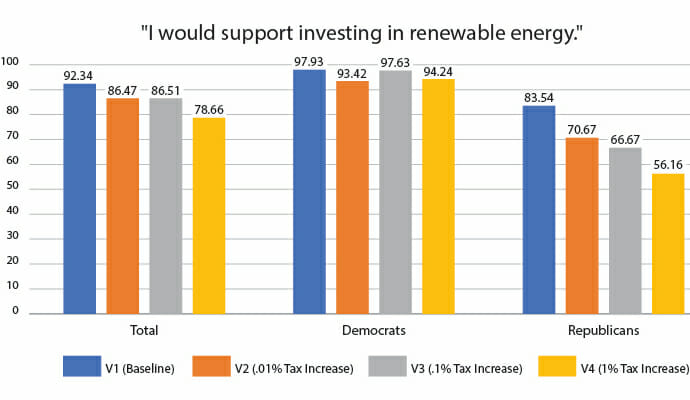
Americans Appear to Support Renewable Energy, But to what Extent?
Renewable energy refers to non-depletable natural sources such as wind or solar energy, and often requires a considerable upfront investment to be commercially viable.
The scope of the problem is clear. In 2017, the United States accounted for about 17% of the world’s total consumption of primary energy, energy taken directly from natural resources. Meanwhile, according to the U.S. Energy Information Administration, in 2018 the use of renewable energy sources accounted for only 11% of the United States’ total sources for primary energy consumption, with the main sources for energy consisting of petroleum (36%), natural gas (31%), coal (13%), and nuclear electric power (8%). The use of nonrenewable resources poses not only diverse environmental problems but potential economic challenges as countries compete over finite supplies.
As the Earth’s temperature and water levels continue to rise, environmental organizations and lobbyist groups emphasize the need for greater investment in renewable energy for its expected impact in reducing emissions of greenhouse gasses into the atmosphere. While young people are generally more likely to prioritize renewable energy development, the support for these methods are steadily rising across all age groups. A study by Yale University and George Mason University also found widespread support, with 82% of registered voters believing that there should be more funding dedicated to renewable energy research, and 89% of Democrats and 71% of Republicans supporting tax rebates for people who purchase energy-efficient vehicles or solar panels.
Another Yale study found that the policies of the “Green New Deal” proposed by members of Congress also has widespread bipartisan support when described merely by its policy implications with no mention of Democratic support. According to the study, 81% of respondents either “somewhat support” or “strongly support” the Green New Deal, which would produce 100% of America’s energy from renewable sources within the next ten years. An overwhelming majority (82%) knew nothing of the Green New Deal, suggesting that support was not a partisan decision. The study further suggests that policy framing impacts public support and the necessity to avoid language that evokes a partisan response.

In addition, partisan differences persist around the cost of these environmental initiatives. A survey by the Pew Research Center found that a majority of respondents (65%) believed that stricter environmental laws and regulations are worth the cost, with 55% of Republicans and Republican-leaning respondents believing that these laws and regulations would cost jobs and hurt the economy. Wide variation existed even among Republican respondents. While 66% of conservative Republicans believed the laws would hurt the economy, 60% of liberal Republicans agreed that environmental laws were worth the cost. This suggests the need to identify how perceived costs influence support for renewable energy policy.
While there may be broad support for renewable energy programs in the abstract, we assumed that costs would influence perceptions. Even if renewable energy programs may at some point be cost neutral, the initial setup costs would not be. Thus, we wanted to identify whether support was influenced by references to increased taxes. To address this, we conducted a web survey via mTurk Amazon to address American support for investing in renewable energy on September 11, 2019 (1,072 respondents). Respondents were randomly assigned to one of four renewable energy questions, ranging from no references to taxes up to an increase in taxes of 1%.
Please evaluate the following statement:
V1. I would support investing in renewable energy.
V2. I would support investing in renewable energy, even if it increases my taxes by .01%.
V3. I would support investing in renewable energy, even if it increases my taxes by .1%.
V4. I would support investing in renewable energy, even if it increases my taxes by 1%.
 A few patterns emerge. First, overall we find that most respondents supported investment, with some sensitivity to costs. Support drops by about 6% when tax increases of under 1% are presented and dropping by nearly 14% when a tax increase of 1% is presented. Secondly, Republicans are particularly sensitive to taxes, whereas Democrats do not seem to be. The partisan variance could be explained by a difference in perceptions of the cost versus benefit of renewable resource investment.
A few patterns emerge. First, overall we find that most respondents supported investment, with some sensitivity to costs. Support drops by about 6% when tax increases of under 1% are presented and dropping by nearly 14% when a tax increase of 1% is presented. Secondly, Republicans are particularly sensitive to taxes, whereas Democrats do not seem to be. The partisan variance could be explained by a difference in perceptions of the cost versus benefit of renewable resource investment.
A 2015 Pew Research Center survey asked respondents about the fairness of their tax payments considering what they get from the federal government. While 53% believed they pay the right amount, 40% agreed that they pay more than their fair share. The same study shows views of the IRS to be near mirror images, with Democrats having a largely positive view (62% favorable) compared to Republicans (64% unfavorable). Taken as a whole, one may assume those that may be generally supportive of environmental policies, especially if viewing through a partisan lens, may not believe that a tax increase of 1% would be worth the cost.
Our findings are consistent with previous research on partisan divergence on investing in renewable energy reflected in both the United States and Canada. American Republicans are significantly less likely to believe that climate change is occurring due to human activity than Democrats. Likewise, members of the Federal Conservative Party in Canada are also less likely to believe that climate change is occurring. One of the reasons for this ideological gap in both countries could be explained by skepticism about the veracity of findings by climate scientists as 47% of Americans in 2011 believed that scientists were exaggerating evidence about global warming. Our own survey finds that almost all Democrat respondents stated they believed climate change and global warming existed (97.3% and 97.1% respectively), while Republican respondents were not only less supportive, but more sensitive to the terms climate change (65.2%) and global warming (56%).
Our findings also are consistent with tax-sensitivity, especially among Republicans, but does not suggest that this is an insurmountable hurdle. A report from the University of Michigan finds public support for a carbon tax, regardless of party identification, increased when use for the revenue of the tax was specified, especially when the revenues were marked for research in renewable energy.
Overall, our findings suggest the potential for broad support in renewable energy investments, but greater consideration to tax-sensitivity and how tax money will be spent is crucial to maintaining this support. The findings also suggest it might be possible to sidestep some of the thornier environmental issues by focusing on renewable energy. For example, a Pew Research Center survey shows a stark partisan divergence on the perceived causes of climate change, with 71% of Democrats and Democratic-leaning independents believing that climate change is mainly caused by human activity, compared to only 27% of Republicans and Republican-leaning independents. By separating the renewable energy discussion from the broader climate change debates, it may be possible to construct policies that are both cost-efficient and convey the concrete advantages that come from investing in renewable energy.



